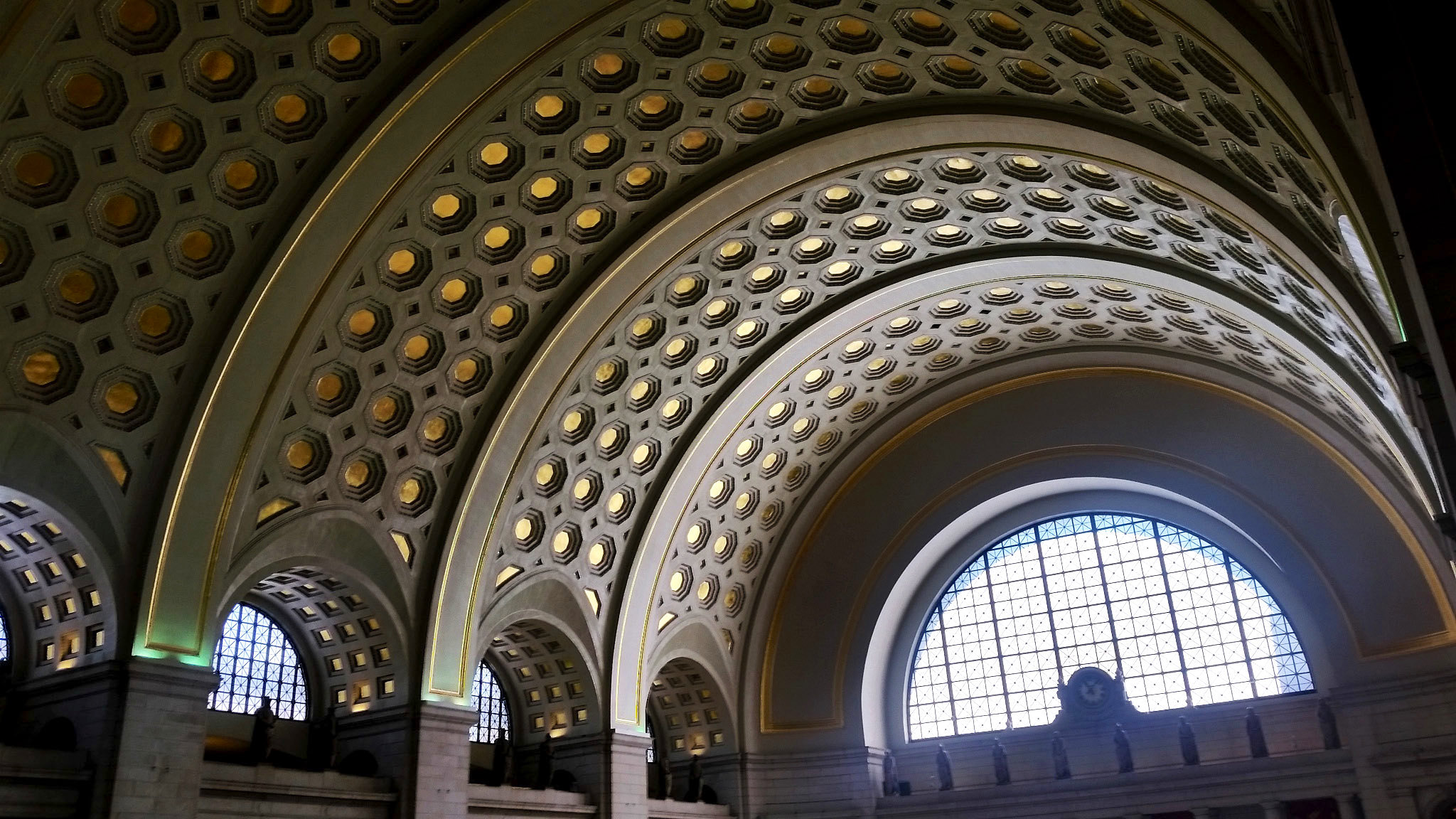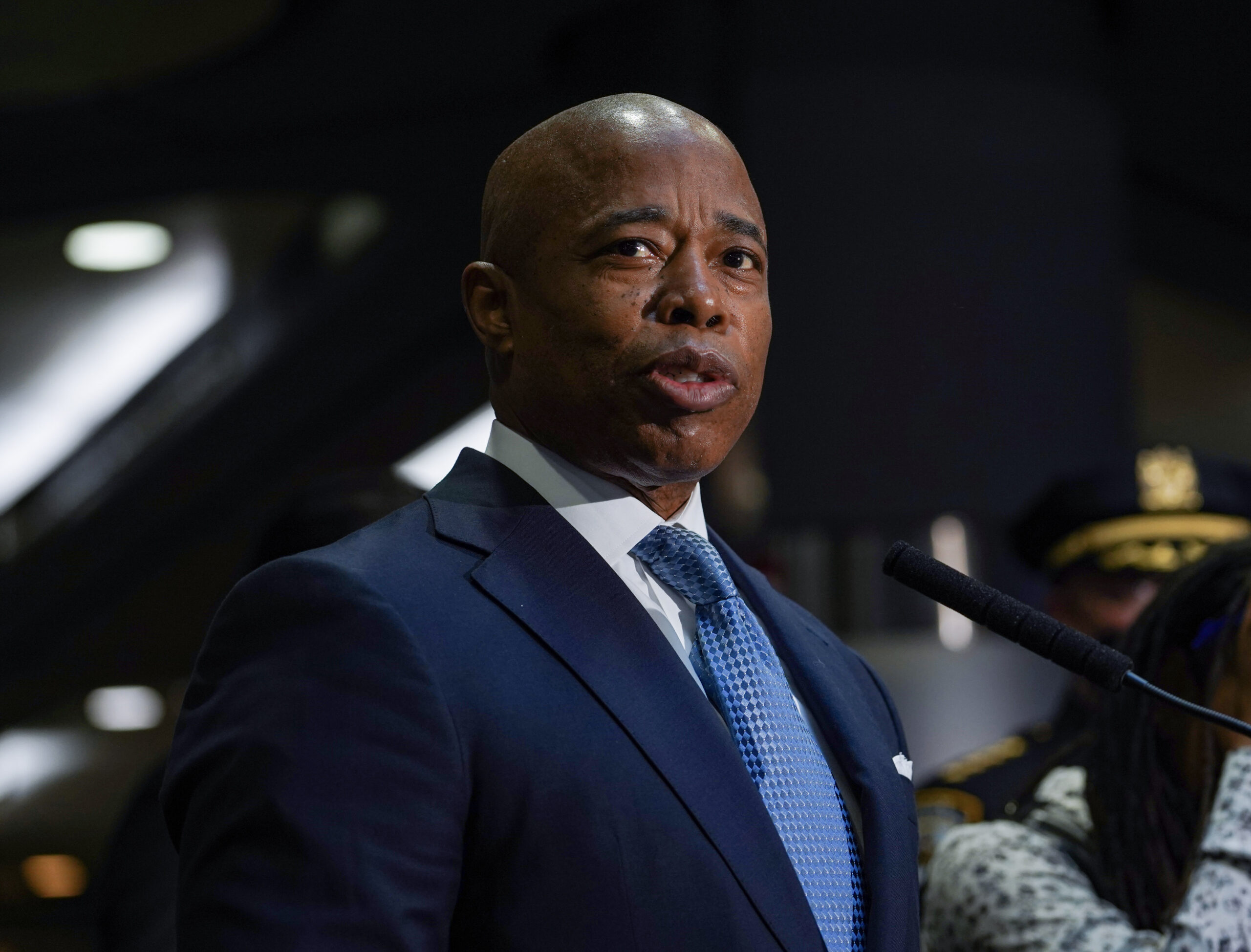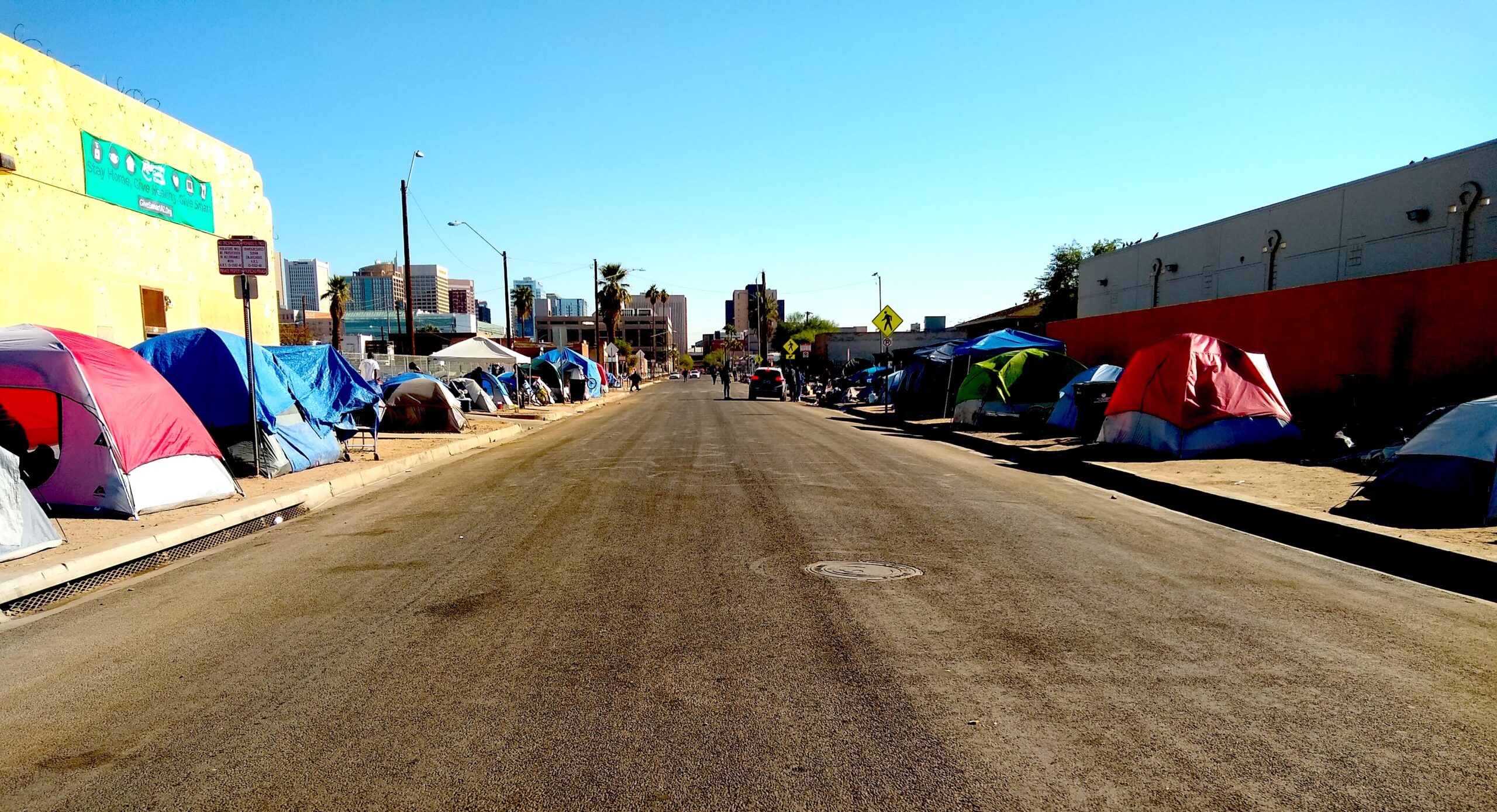Liz Theoharis imagines building a pro-democracy movement attuned to the needs and dreams of everyday people.

Union Station main hall vault, Washington, D.C. (BeyondDC, Flickr, CC BY-NC-ND 2.0)
By Liz Theoharis
TomDispatch.com
 Earlier this month, I was in Washington, D.C.’s Union Station. The weather had turned cold and I couldn’t help noticing what an inhospitable place it had become for the city’s homeless and dispossessed.
Earlier this month, I was in Washington, D.C.’s Union Station. The weather had turned cold and I couldn’t help noticing what an inhospitable place it had become for the city’s homeless and dispossessed.
Once upon a time, anyone was allowed to be in the train station at any hour. Now, there were signs everywhere announcing that you needed a ticket to be there. Other warning signs indicated that you could only sit for 30 minutes at a time at the food-court tables, while barriers had been placed where benches used to be to make it that much harder to congregate, no less sit down.
With winter descending on the capital, all this struck me as particularly cruel when it came to those unfortunate enough to be unhoused. That sense of cruelty was heightened by the knowledge that legions of policymakers, politicians, and lobbyists — with the power to pass legislation that could curtail evictions, protect tenants, and expand affordable housing — travel through Union Station regularly.
When I left D.C., I headed for my hometown, New York City, where Penn Station has been made similarly unwelcome to the homeless. Entrances are closed; police are everywhere; and the new Moynihan terminal, modern and gleaming, was designed without public seating to ward off unwanted visitors.
Worse yet, after a summer spent destroying homeless encampments and cutting funding for homeless services, New York Mayor Eric Adams recently announced that the city would soon begin involuntarily institutionalizing homeless people.
Rather than address a growing mental health crisis among the most marginalized in his city with expanded resources and far greater access to health care, housing, and other services, Adams has chosen the path of further punishment for the poor.

New York City Mayor Eric Adams in February. (Marc A. Hermann / MTA, CC BY 2.0, Wikimedia Commons)
It’s a bitter wonder that our political capital and our financial capital have taken such a hard line on homelessness and poverty in the richest country on the planet.
And this is happening in a nation in which 8-to-10 million people lack a home entirely or live on the brink; a nation that reached record-high rents this year (with three-quarters of our largest cities experiencing double-digit growth in prices); that spends more on health care with generally worse outcomes than any other advanced economy; and that continues to chisel away at public housing, privatize health care, and close hospitals, while real-estate agencies, financial speculators, and pharmaceutical companies enrich themselves in striking ways.
Walking around Union Station, I also couldn’t help thinking about the administration’s decision to end the recent rail strike by stripping workers of their right to collective bargaining and denying them more than a day of paid sick leave a year. The president claimed that breaking the strike was necessary to protect the economy from disaster.
Yet little attention was given to the sky-high profits of the railroad companies, which doubled during the pandemic. The price tag for more paid sick leave for union workers was estimated at about $321 million annually. Compare that to the $7 billion railroad companies made during the 90 days they opposed the strike and the more than $200 million rail CEOs raked in last year.
In the shadow of such figures, how could paid sick leave during an ongoing pandemic be anything but a basic necessity for front-line workers?

Union Pacific 6936 diesel locomotive. (vxla, CC BY 2.0, Wikimedia Commons)
The Deeper Meaning of Democracy
All of this left me thinking about the ongoing debate over American democracy, not to mention the recent Georgia runoff where Sen. Raphael Warnock, even as he celebrated his victory over Herschel Walker, pointed to the negative impact of voter suppression on the election.
Today, the rise in outright authoritarianism and white Christian nationalism in our body politic poses a genuine danger to the future health and well-being of our society. At the same time, a revived pro-democracy movement has also begun to emerge, committed to fighting for free and fair elections, the rule of law, and the peaceful transfer of power. But let’s be honest: if we stop there, we cheapen the noble urge for a truly decent democracy.
It’s precisely when our governing ideals are under ever more intense attack that you should ask what we mean by invoking democracy. Do we mean an electoral system shaped by the will of the majority? If so, given growing voter suppression tactics, [and big money in politics] our system is already a far cry from any democratic ideal. Or do we mean more? In fact, shouldn’t democracy mean more?
For me, a democratic society means that everyone, including the poor, has a say in how our lives are lived and workplaces organized. It’s a society in which the homeless aren’t criminalized, the health of workers is protected, and people are treated with dignity by a government of their choice.
And I truly believe that, when you strip away the partisan rhetoric and political spin, this is a vision shared by a majority of Americans.
In response to Mayor Adams’s encampment sweeps this summer, one homeless man interviewed by The Guardian offered this explanation: “Fascism works like that — as soon as there’s a tightening of the belt or any sort of shift into harder times, that fascist and oppressive elements within countries will immediately try to attack the most vulnerable.”
So how do we fight such an emboldened threat and the dangers faced by those at greatest risk among us?
Support CN’s Winter Fund Drive!
I certainly don’t have the full answers to such questions, but a partial solution, I suspect, lies in building a pro-democracy movement attuned not just to elections (and the legal fights that, these days, regularly go with them in Congress and state legislatures), but to the needs and dreams of everyday people.
That would require a willingness to reach into communities that have all too often been forgotten or abandoned and earnestly follow the leadership of the people who live there.
Permanently Organizing the Unorganized
At this time of year, some communities celebrate Las Posadas, re-enacting Jesus’s birth in the humble city of Bethlehem. Though many of us have been taught to imagine that birth as a moment of tranquility, there is, in fact, great hardship and conflict at the heart of the nativity scene.
Indeed, Jesus was born in a time of tremendous violence and injustice. In the days leading up to his birth, a militarized police force had pushed migrant people back to their lands of origin so that the authorities could demand taxes and tributes.
The local ruler had sent out spies to ensure that his authority wasn’t challenged and, lest anyone dare to do so, had ordered thousands of young Jewish boys murdered. Amid that swirl of state-sanctioned violence, Mary and Joseph were driven from their home, forcing Mary to give birth in a small, dirty manger.
Jesus, in other words, was born homeless and undocumented in the land of empire.

Las Posadas in Mexico. (Karycalde, CC BY-SA 4.0, Wikimedia Commons)
During Las Posadas, communities from the Bronx to Los Angeles retell that story, highlighting the gentrification of neighborhoods that’s pricing out the poor, unjust immigration policies that are unfairly separating families, and a housing crisis that’s left millions in need of — dare I use the word? — stable living quarters during the holidays.
Included in the social critique that lurks behind Las Posadas is the belief that everyday people should have the right to determine the course of their own lives, rather than be pawns to the machinations of the wealthy and powerful.
In Texas and New Mexico, the Border Network for Human Rights celebrates Christmas among the thousands of families it’s been working with for the past 20 years. Fernando Garcia, its director, has taught me much about organizing among the poor and dispossessed, offering a vision of “permanently organized communities.”
At the heart of the Border Network’s vision is the idea of organizing an enduring network of connected families living in that part of our country. As for its focus, as Garcia explains it, “Whatever issue they feel that they need to tackle is the priority.”
Building durable and lasting organized communities, especially among those most impacted by injustice, is something a pro-democracy movement should take seriously indeed. In fact, it’s one place where, all too sadly, we lag behind the forces of authoritarianism and white Christian nationalism.
In many poor communities, politicized reactionary churches and para-church organizations are already well practiced in providing not just political and theological messaging and training, but material aid and a sense of belonging to hurting people. Those concerned with justice and inclusion would do well to follow suit.
In the coming years, movements dedicated to democracy and our economic flourishing need to invest time and resources in building permanently organized communities to help meet the daily needs of impacted Americans, while offering a sense of what democracy looks like in practice, up close and personal.
As the threat of yet more political turmoil and escalating violence looms, isn’t it time to break through the isolation that so many people feel with a new sense of collective power? Which brings me to a larger point: in order to build a pro-democracy movement capable of contending with the influence of authoritarianism and bad theology, we need to leave progressive bubbles and silos and commit ourselves to organizing the unorganized — and following their lead.
The newly launched Union of Southern Service Workers (USSW) offers a helpful template. The USSW emerged from the Fight for $15 movement and a long history of Southern organizing. Calling for “community unionism,” it intends to link labor struggles to community life, while supporting workers as they fight for justice.
Awakening the Sleeping Giant

Tents on West Madison Street, Phoenix, near homeless shelter services. (Thayne Tuason, CC BY 4.0, Wikimedia Commons)
Before the Covid-19 pandemic first began spreading across the fissures of racism and poverty in our society, not to speak of the current crisis of inflation and impending recession, there were already 140 million Americans who were either poor or a $400 emergency away from poverty.
Those numbers have only grown. Some poor people are already politically active, but many aren’t — not because the poor don’t care but because politics-as-usual doesn’t speak to the daily stresses of their lives.
There is, in other words, a sleeping giant out there that, when awakened, could shift the political and moral calculus of the nation. Were that mass of poor, impacted people to begin to believe that democracy could mean something real and positive in their lives, watch out.
Should that happen — and, as Frederick Douglass once said, “those who would be free themselves must strike the first blow” — you could end up with a pro-democracy movement that would be unstoppable.
Almost five years ago, I helped launch the Poor People’s Campaign: A National Call for Moral Revival alongside Bishop William J. Barber II, president of Repairers of the Breach, as well as my colleagues at the Kairos Center, and thousands of directly impacted people, community organizers, and religious leaders.
Our core theory of change, drawn from our study of history, is that the most transformative movements in our national storybook have always relied on generations of poor, deeply impacted people coming together to help lead a national change for the better.
Part of our analysis is that poor people nationwide could become a transformative voting bloc if only politics were more relevant in their lives.
In 2021, the Poor People’s Campaign released a report on the impact of poor voters in the 2020 elections. It showed that, contrary to popular belief, poor and low-income people made up a remarkably sizable percentage of the electorate (and, surprisingly enough, an even larger percentage in battleground states).
Looking at racial demographics among such voters, the report found that turnout was significant, whatever their race. Given the total vote share for Joe Biden and down-ballot Democrats that year, the data even challenged the notion that poor white voters were a crucial part of Donald Trump’s base.
Today, our electoral system has become gridlocked and increasingly gerrymandered to empower minoritarian rule at the expense of the will of the majority. Thanks to that, it can often feel as if the country is evenly split on issues ranging from healthcare, housing, and jobs to abortion and environmental protection.
But non-partisan polls continue to reaffirm that the majority of the country supports more economic, racial, and gender justice. Results from ballot measures in the midterm elections reflect a similar reality, whether it was people in various states voting to protect the right to abortion, passing higher minimum wage laws, or expanding Medicaid.
And contrary to what too many of our politicians and the media that support them claim, this country can indeed afford such widely popular and deeply needed ballot measures and policies.
In fact, as Nobel Laureate Joseph Stieglitz wrote in his award-winning The Price of Inequality, the question is not whether we can afford housing, healthcare, paid sick leave, living wages, immigrant rights, and more; it’s whether we can afford not to — especially since failing to address the people’s needs weakens our democracy.
In fact, right before the midterms and the beginning of the holiday season, retired professor of humanities Jack Metzgar wrote at Inequality.org:
“Because the wealth of the wealthy confers both economic and political power, we cannot adequately defend democracy if we go on allowing our economic oligarchy a completely free lunch… Next time you hear a politician say ‘we’ can’t afford something that clearly needs doing, just stop a moment and think — about what a wealth tax on a very small proportion of Americans could accomplish.”
Indeed, it can be done! Si, se puede! After all, isn’t this the true story of Christmas?
So, this season, when you listen to Handel’s Messiah, attend to the words about lifting from the bottom up: “Every valley shall be exalted and every mountain and hill made low; the crooked straight and the rough places plain.”
As 2022 comes to a close, this is where I draw hope and inspiration.
Liz Theoharis, a TomDispatch regular, is a theologian, ordained minister, and anti-poverty activist. Co-chair of the Poor People’s Campaign: A National Call for Moral Revival and director of the Kairos Center for Religions, Rights and Social Justice at Union Theological Seminary in New York City, she is the author of Always With Us? What Jesus Really Said About the Poor and We Cry Justice: Reading the Bible with the Poor People’s Campaign. Follow her on Twitter at @liztheo.
This article is from TomDispatch.com.
The views expressed are solely those of the author and may or may not reflect those of Consortium News.
Support CN’s
Winter Fund Drive!![]()
Donate securely by credit card or check by clicking the red button:


J’ai toujours cru qu’à la base, le système américain était le plus démocratique. À cause justement des “checks and balances”. Malheureusement ce système n’a pas su ni progresser ni s’adapter aux réalités nouvelles.
D’abord le financement débridé des partis politiques.les USA ne sont plus une démocratie mais une véritable ploutocratie où l’argent fait foi de tout
La représentativité du Sénat
La Californie, avec 40 millions d’âmes, a deux sénateurs. Le Wyoming avec 600 000 habitants en a deux.
Le découpage des districts électoraux et les lois électorales de plusieurs états
Le collège électoral.
Institué au départ pour obtenir l’adhésion de certains petits états, il n’a plus sa raison d’être.
I’ve been thinking for a long time that like, feeding the hungry solves hunger and housing the homeless solves homelessness, taking fortunes from the wealthy solves inequality. Getting all but the richest people to realize that letting people become too rich creates far more problems than it solves would be the first step in organizing regular people to demand equality by starting at the top and working all the way down to a point where people could no longer inordinately impact the lives of others. My first thought was to get to the point where no individual could have a net worth of more than $10 million. As inflation and our foreign policy threatens the value of the dollar, that figure becomes even more realistic. I don’t know what the French revolutionaries decided was a good figure but they definitely had the right solution. Let the pitchfork wielding crowds sort out the details.
Yup! Making excessive wealth punishable because of the social burdens it creates just might be the solution.
When considering the responsibilities that could be placed at the feet of the current rendition of the IRS, major changes there would be a necessity. Currently there is no reason not to do so especially when corporate lawyers assist the government in writing the rules the wealthiest individuals and corporations play by.
I can hear it now, “Mr. Williamson, you have no idea of the issues something would bring up, you must be mad!”
Well I am very angry for sure and it seems most appropriate that those who have manipulated the system to the point the IRS has been manipulated have shown utter and total disrespect for the system.
My case in point would be a simple look at the manner the Village Idiot from NYC has conducted himself and then point out that his serves as an example revealing what excessive greed and power have resulted in.
We could very fittingly call it ‘Trumps Tax Law”. Everyone who earns 10 million dollars has one tax code everyone else who earns more to enjoy very close scrutiny so that every penny owed is paid into the government coffers. No exceptions! We might all be surprised at how little might be needed to pull us from this death spiral we find ourselves in.
What could be more patriotic than having the wealthy show good faith to the system that paid them off?
Call it the punishment for individuals hiding behind the corporations illegal tax law system and using it for gaining undue influence in the congress would be harsh, it will be called the “Trump Patriotic Taxing System”.
No corporate lawyers involved in lobbying etc.
Hell what could it hurt we will go broke regardless, the only difference will be will be the life conditions of the worst off of our numbers.
Thanks CN
To put this dose of human reality in perspective think about this. What is wrong with this picture?
Various estimates put the cost of wars since 2001 @ ~ $8 trillion dollars U.S..
Speaking of the U.S. Govt. , our government needs to realize our military spending is totally out of control and make some much needed emergency adjustments.
I happen to agree with Liz about that the number of homeless | poor numbers in this, country are staggering.
These wars all of them elective in my opinion and not matters of immediate national security. Conversely I
believe this problem of the poor and homeless is very important to national security. All one needs to do is reflect
on what had happened to the pandemic plan that failed a mere three years ago. We all see what impact the
Covid-19 had on the country. Of course we can’t forget the disastrous impact of the Orange POTUS, which in my
opinion taught everyone just how much a weak, faux POTUS can negatively affect the Union either.
Our government needs to realize our military spending is totally out of control and make some much needed adjustments.
Thanks CN
One can have ‘elections’ without ‘democracy.’
One can have ‘democracy’ without ‘elections.’
The first is obvious and has been seen regularly, most dictators hold elections. There are many ways of rigging them such that the desired persons win the ‘election’.
The second might leave more people wondering, but it is true in a ‘direct democracy’ such as the early settlements in New England had. There are no elections because nobody is elected to hold power because all power resides with the ‘town meeting’ which makes all decisions with direct democracy. Nobody appears to want to notice that modern communication technology would make such a system viable today, but that’s a different discussion.
Elections are in fact a barrier to real democracy because they only occur at certain intervals and depend on delegating power to an elected individual. The first problem is what happens between elections when people need to consult with their representatives, and the second problem is the level of delegated authority given to those elected representatives and the requirements for accountability and transparency.
A third problem is that of delegation of authority on specific issues and how it should be managed by the voters to ensure they are represented properly in each case, and to make sure the elected person acts responsibly and in their interests at all times. This means full accountability and transparency.
The New England example is closer to what is needed, where the representation is ongoing, and does not involve giving an individual any level of authority that cannot easily be managed by those represented.
Democracy as we know it today fails miserably because of this lack of ongoing representation and appropriate delegation of authority, accountability and transparency, and opens it up to abuse, manipulation and corruption – such as we now see in all so-called democracies.
Any new version of democracy must have clearly defined legal limits and controls on these matters, to prevent abuse and manipulation. It has to be protected from those that will attempt to hijack and corrupt it.
BTW, a ‘wealth tax’ is a very old and accepted idea.
Remember, that for most of human history up until the modern age, ‘wealth’ was in the form of ‘land’. Traditionally, wealth was always the ownership of land. And ‘property taxes’ on land date back to Colonial times. Thus, it can truly be said that ‘wealth taxes’ pre-date the United States of America.
But strangely, the so-called ‘left’ Democrats likes to treat the concept as something new and radical and thus easy to argue against and defeat, like everything else the modern ‘left’ does. They love to lose. They are designed to lose, but keep the donations rolling in while they lose and lose and lose …
What, you mean a government of the people, by the people and for the people? A government which declares that ALL people have certain unalienable rights, including the right to live and pursue happiness?
Like the famous Ghandi quote about ‘western civilization’, I think it would be a good idea.
If people want democracy, they have to take it for themselves. The rich will never just give it to them, and if the people manage to grab the brass ring for a short while, the rich will try hard to take it away from them. You can judge a democracy by the efforts put forth to maintain a democracy, because a democracy can only maintain itself with large and regular fights against those who want power for themselves and hate it residing with the people. If you don’t see such a large effort to maintain a true government of the people, then you don’t see a government of the people.
Very few living Americans know what Democracy looks like. To actually see it required joining radical movements where democracy did flourish for a short time within the movement. But America itself has not been an actual democracy in my lifetime. America needs to be a democracy, even if it has not been one for a very long time, even if it never really was one, humanity needs America to become a democracy.
The original Poor People’s Army was not a Ford foundation-embraced lackey of the Democratic Party. Notice, the Poor People’s Movement USED to talk about real liberation theology, the poor governed by the poor — not the Ford Foundation/Democratic Party beloved generalities of “the poor have a say.” Liberation theology used to mean Jesus WAS the poor. EVERYONE did not get to have a say, hell no! The rich and the Pharisees/Sadducees/1%/DNC/RNC would have NO SAY in a democratic society. The poor would govern — not folks with foundation salaries organizing FOR the poor. Or leading Poor People’s Movements.
Check out the Poor People’s Army (hxxps://poorpeoplesarmy.com/) if you want to see what Jesus would be doing — squatting abandoned houses for the poor. Promoting self-governing and self-funding of the people, not sucking on the diseased tit of the Ford Foundation. Consortium News, please interview Cheri Honkala and the Poor People’s Army.
Solutions to inequality and continual wars will NOT be found in electoral politics. The political class are proxies for the ruling oligarchic elite. US citizens internalizer at a young age one myth after another about US ‘freedom’ and ‘democracy’ – the exceptional nation! – it’s part and parcel to schooling in the US. Mass corporate culture/media only reinforces these myths. —– it takes a conscious effort for one to break out of the matrix of propaganda, corporate news/media and seek out alternative perspectives of issues and events.
No, it will take nothing less than the solidarity of working people globally – the greatest social force in the world – to bring an end to our oppressive capitalist life. Massive ongoing general strikes, mass civil action, sit down strikes. Everything and anything. ———– Just as a pandemic can NOT be fought successfully on a national basis, so it is for upending global capitalism. —– Sounds insurmountable? Yep. — But, there it is.
The mega rich and their political puppets are now actively working to diminish the amount of people who are “surplus to requirement”. They want to rule over a controlled population that has no Right to oppose that power, no Right to protest, no Right to dream of or acquire a better future.
How to create a surplus ? Reverse 10k years of tilling and killing soil life which kills everything above it eventually. DIRT ;Erosion of Empires
David Montgomery What if we put everyone to work reversing that and terraforming back to an ecological Agroforestry abundance planet. Can’t get anyone to work and there will little ” work” to do once this is complete.
Karl Marx and Friedrich Engels already devised a social system that included everybody back in 1847. There is no need for anything else.
Under a capitalist political economy, inequality will continue to expand – it’s baked in to the cake.
Obviously for the US “leaders” what is important is certainly not the welfare of the people except for the wealthy and the corporations, but being in charge of the world, telling other countries what to do, spreading our idea of “democracy and freedom” whether they want it or not.
Thank you. In our “neoliberal democracy,” Jesus would be treated as an embarrassment and probably persecuted as a radical and communist with many Christian religious bodies leading the charge. Actually, that was true in his pre-Christian time as well.
As for democracy, Princeton studies in 2014 showed that the public has zero influence over government policy. That is where we are. Of course, it’s not getting better. Instead government effort has been poured into how to better manage public opinion through mainstream propaganda. This is surely a dead-end.
Another point about democracy; what is the difference between a totalitarian government and a democracy without transparency in governance? Nothing at all.
The Constitution says “We the people…” Notably, not “We the government,” or any other special or elite group. All government power derives from the consent of the people. It has none of its own. It also has no money of its own. All government money is money given by the people to act on their behalf, to improve the quality of their lives and the life of society.
“The people,” in a democracy, are also responsible for what their government does in their name. It is not a luxury but an obligation. Holding leaders to account is not a luxury but a responsibility. In order to fulfill that responsibility, the workings of government must necessarily be transparent by default. Exceptional need for secrecy must be exactly that, exceptional, short-lived and well managed. If something has to be done in secret, don’t do it.
Neither the GOP nor the “democrat in name only” parties are democratic at all. Not even a hint. And neither works at all for the benefit of the public in any meaningful way for whom they should be working all the time.
If no alternative appears then the days of the American republic are severely numbered. I suspect that there will be a “Let them eat cake” moment and the outcome will be horrific. Leading powers and empires are more often lost due to internal rot than external forces. That rot is usually characterized by out of control elite privilege that goes hand in hand with small, inept and self-serving leaders. In America, the ingredients are already in place and the pot is simmering.
No easy task but…greed and corruption MUST be gotten under control in order for any society to function and prosper. Eradicate ‘killer kapitalism’.
A serious pro-democracy movement must begin at long last by correcting the Orwellian fiction that elections have anything whatsoever to do with democracy. They do not. They did not to the people who invented democracy in the first place, and they did not for two thousand years after Aristotle’s death. Elections were considered to be oligarchic, the opposite of rule by the people, for millennia to anything familiar with the word “democracy”.
It was only when several figures (mostly ruling class) coming out of the American and French Revolutions decided to distort and invert the meaning of “democracy” that we arrived today at the farcical notion that elections are democratic. Before a single ballot is cast, elections always select from a certain stratum of society with the resources, time, etc. to run for office. The Athenians understood this, and it’s obvious to anyone looking at electoral politics in America today what class of people end up in elected offices.
Real democracy is government by random lot and relies upon that fundamental law of statistics, the Law of Large Numbers, to select a representative sample of the population for regular government responsibilities. Shall we really continue to delude ourselves that electoral politics, THE HISTORIC OPPOSITE OF DEMOCRACY, can somehow magically become democratic if we just convince our rulers to construct a competent social safety net? It’s time for a clean break. A serious pro-democracy movement will seek to dispel these 200+ years of anti-democratic propaganda and put forth simple demands: a new constitution enshrining lot-based government bodies for daily government work and direct referenda for major political decisions. Genuine rule by the people will find it all too easy to build the social safety nets we desperately need.
Sorry to burst your bubble folks but “democracy” is a fallacy –
“Richest country on the planet”?? This cliché is in serious need of reexamination and/or qualification, as anyone who has travelled to widely can attest.
It’s not evenly distributed. You just need to visit the right gated communities.
As disgraceful as federal spending is and all the policies driven by corporate interests, the war machine, and the extractive economy as the assault on all that is continues unabated, the author rightly calls out just how local the problem is. It is not only federal policies and priorities, but equally local governments serving the same narrow interests.
If there is one area in addition to wage actions needed, it is the area of cooperative housing. I live in one such community, and as a retiree, I couldn’t live cheaper even if I choose to move to another lower-cost-of-living country. The coop owns the land and provides the shared services to its “shareholders” (that is those of us who live here). I see similar communities around us where the rents rise every year and begin to make it impossible to stay there. The rents go up and the care given the dwellings goes down as they slowly become another depressing collection of substandard housing. Those in the spectrum of the middle class and lower are in desperate need to both be taught the advantages of cooperative house and the organizational skills to make it happen.
And if your portfolio includes REITs, know that just as your MIC stocks feed returns in your mutual funds and 401Ks, so do these investments that capitalize on jacked-up rents to profit the shareholders at the expense of the tenants.
I wish I could name one politician (past and present) in Washington who has not been an abject failure to my values and the needs of the poor, but alas, every single elected legislator and president in my (long) lifetime has betrayed their campaign promises and the American people for war and ever-increasing wealth disparity. Now with the propaganda success of the Russia/China/Iran phobia, even the notion of diplomacy is villainized. The poor have an uphill battle like no time in our history. The brain dead among us has reached epic proportions. As others have rightly noted, we are the most successfully propagandized people of all time.
“Every valley shall be exalted…” In all my years of going to church I never realized what that meant.
Unless and until the poor people’s campaign and other nominally left organizations part ways with the Dems (in a very public way) NOTHING will change. It was outrageous to see Reverend Barber throw down with the proxy war in Ukraine. No to war, Reverend, especially imperial proxy wars. And, there is no need for a “wealth tax” to fund anything: we don’t need the rich and their money. The government creates thr money for any kind of social program; it isn’t funded by taxes we need to pry out of the rich. You’ll be asking Dems to do that, and they WILL NEVER do it. They work for Wall Street like the Republicans they pretend to hate.
Amen! Dr. King said “we should be bound by allegiances and loyalties which are broader and deeper than nationalism.” To support our government’s war for oil in Donbas and Ukraine is to worship “profit motives and property rights” (Dr. King) and antithetical to loving the poor of all nations.
When “profit movies and property rights are considered more important than people, the giant triplets of racism, materialism and militarism are incapable of being conquered.” Chose negotiated peace and referendums (Life) or Big Energy (Mammon)/DNC/1%. The choice is ours.